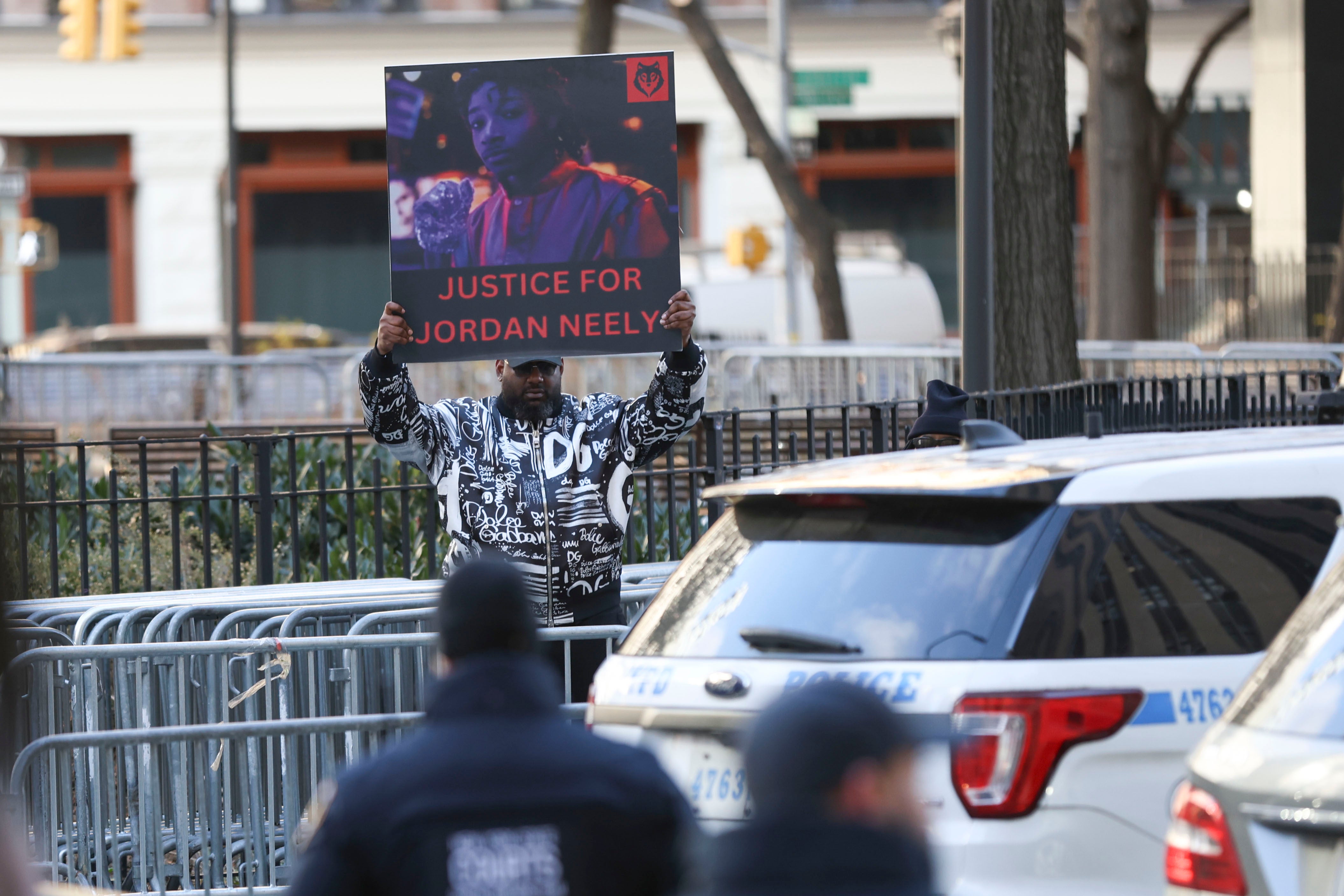Daniel Penny acquitted for chokehold death of Jordan Neely on New York City subway

Get Daily US News Headlines In Your Inbox
"Latest US Headlines: Your Essential Briefing"
Your Update On The Latest US Headlines
I would like to receive email notifications about promotions, events, and news from The Independent. Please check our privacy policy.

A jury in New York City has found 26-year-old Daniel Penny not guilty in the case of Jordan Neely, a homeless man facing mental health struggles. Neely died after Penny placed him in a chokehold for almost six minutes during a heated situation on the subway in 2023.
The jury found Penny not guilty of criminally negligent homicide in connection with Neely's death. A more serious manslaughter charge was dropped earlier in their discussions since the jury couldn't reach a unanimous decision on that issue. Both charges were felonies and could have resulted in prison time.
The courtroom erupted with both cheers and shouts of anger when the not-guilty verdict was announced. According to CNN, Neely’s father had to be removed from the room after he voiced his frustration loudly using profanity.
Another individual departed, overcome with sobs.
Penny, who had mostly kept a serious face throughout the trial, offered a quick smile when the verdict was announced.
Republican City Council member Joann Ariola from New York praised the not-guilty verdict, stating that “justice has been served.”
"Daniel Penny is a hero, and I'm relieved that a decent person was not penalized for taking action to protect his fellow New Yorkers from a mentally ill individual who had slipped through the system," Ariola commented.
“Great news for New York City: Daniel Penny has been found not guilty,” said Democratic Council Member Robert Holden in a statement on X. “Justice has been delivered for a U.S. Marine who courageously intervened to safeguard his fellow New Yorkers in a time of crisis.”
"This result emphasizes the importance of concentrating on genuine solutions, such as dealing with unaddressed mental health issues, to stop similar tragedies from occurring in the future."
City councilman Yusef Salaam, one of the Central Park Five who was unjustly found guilty, stated that the ruling highlighted significant shortcomings within the system.
“His death highlights the pressing and long-overdue necessity for a thorough reform in our approach to mental health emergencies and homelessness,” Salaam stated.
In a heartfelt statement made outside the courtroom, Neely's father expressed that his son should never have had to endure this situation.

“It’s painful. It’s truly painful. What are we going to do, everyone? What lies ahead for us now? I’m fed up with this situation. The system is stacked against us. We need to take action.”
The trial that started in October focused on whether Penny, an architecture student and former Marine, had the right to use potentially deadly force against Neely during the incident that occurred on May 1, 2023.
Eyewitnesses recounted that Neely, who performed on the streets, got on the subway and aggressively shouted at the passengers, expressing that he was without food and water and was indifferent about returning to prison. Penny and a few other passengers claimed that Neely also threatened to kill someone.
Prosecutors claimed that Penny's first instinct to protect the other passengers was reasonable and even commendable. However, they contended that he overstepped his bounds and resorted to deadly force when it wasn't needed. They pointed out that he kept restraining Neely after a few passengers had left the train, even though Neely had stopped moving for almost a minute.
"You can’t just take someone's life because they seem dangerous and are expressing crazy ideas, regardless of what they are saying," said Manhattan Assistant District Attorney Dafna Yoran to the jury in her closing remarks.
The defense, on the other hand, contended that Penny's actions were warranted due to the threat he believed the situation posed to the passengers aboard the train.
“Daniel Penny took action to defend them,” said defense lawyer Steven Raiser in his closing statements. “Why? Because he possessed something that the others lacked. Something that was distinctly his.”
The defense brought in a pathologist who stated that there were various external factors that might have played a role in Neely's death. These included his use of synthetic marijuana, his struggle with schizophrenia, and his genetic tendency towards sickle cell issues.
During her testimony in the trial, Dr. Cynthia Harris, the city’s medical examiner, stated that Neely's cause of death was “compression of the neck.” She added that “there is no toxicology result that could alter my view on this matter.”
The court also listened to a Marine Corps instructor who discussed Penny's training in chokehold methods.

The defense argues that Penny intended to place Neely in a non-threatening restraint and wait for law enforcement to arrive.
Throughout the trial, jurors viewed footage of Penny conversing with the police following the incident. In the video, he referred to Neely as a "crackhead" and mentioned that he was "behaving like a madman."
"I only wanted to stop him from reaching other people," Penny explained to the authorities, emphasizing, "I have no intention of harming him."
In other reports, witnesses stated that they felt a sense of relief when Penny restrained Neely. However, they also noted that the former Marine disregarded requests to release the homeless man.
Penny chose not to testify in court, as his defense attorneys argued that the statements he had given to the police already provided a clear account of what happened.
The jury started their discussions on Tuesday, December 2.
The panel of twelve members grappled for several days to come to a unanimous decision.
The judge in charge of the case permitted the prosecutors on Friday (December 6) to remove the most serious accusation against Penny, which was second-degree manslaughter. This decision opened up the possibility for the jury to focus on the lesser charge of criminally negligent homicide.
As the discussions went on, Penny's defense team requested a mistrial, which could have led to a fresh trial with a different jury, but this request was turned down.
In addition to the criminal trial, Neely's father has initiated a lawsuit against Penny on Wednesday, December 4. The lawsuit alleges that Penny's actions were negligent and amounted to assault and battery, which led to Neely's injuries and ultimately his death.
The subway event, where a white man held a Black man in a chokehold for several minutes, rapidly fueled ongoing national discussions surrounding racism, law enforcement, and safety in public spaces.
This occurred following widespread protests across the country after the police in Minneapolis killed George Floyd, a Black man, by kneeling on his neck and back for several minutes, even as bystanders pleaded with them to intervene.
The discussion surrounding the subway incident also struck a chord with several local concerns in New York.
The city has been dealing with concerns over crime in the subway, facing backlash against Mayor Eric Adams for his directive to forcibly hospitalize homeless individuals with mental illnesses, and ongoing issues in providing sufficient housing and support for those without homes.
Penny's legal defense raised millions of dollars through GiveSendGo, a crowdfunding site known for supporting right-wing initiatives. Conservative media figures and politicians praised Penny as a true "Subway Superman," portraying him as an everyday person reclaiming the streets in a city they view as unsafe and governed by Democrats.
Some viewed the murder as an instance of white vigilantism and criticized New York City's neglect of marginalized individuals like Neely. His mother had been a victim of violent crime, and Neely faced his own battles, frequently moving between prison and homeless shelters while dealing with drug issues and mental health problems, including depression and schizophrenia.
New York City’s public advocate, Jumaane Williams, previously shared with The Independent that the media focus on this case has formed a story that undermines the worth of a Black homeless man struggling with mental health issues. He believes this promotes a mindset that dehumanizes some of the most vulnerable residents of New York City.
Following Neely's passing, protesters took to the tracks of the New York City subway to voice their opposition right after the incident. They continued their demonstrations during the trial, covering subway advertisements with signs that read 'A Man Was Lynched Here.' This phrase alludes to historical campaigns against lynching that were part of the Civil Rights movement.
The reporting was contributed by the Associated Press.









































